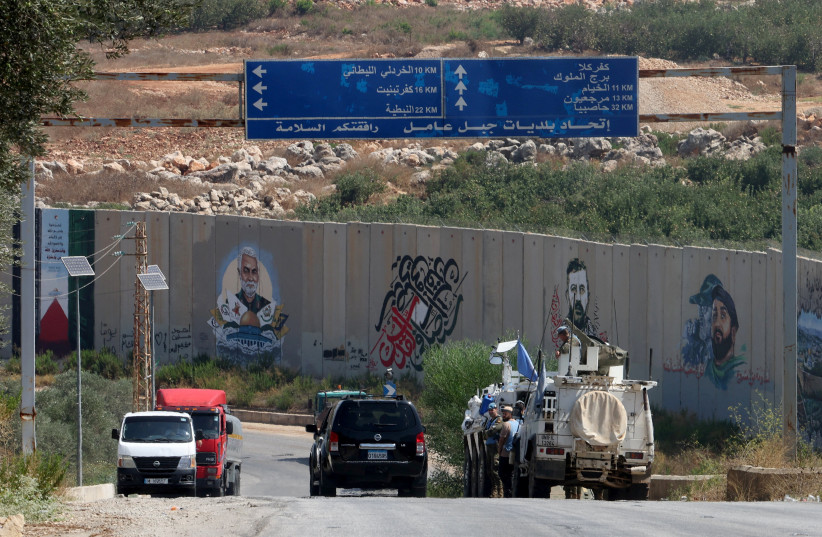Israeli and Lebanese residents on both sides of escalating border clashes say they have never felt such tension.
Fearing their hometowns could become the main front in a war between Israel and the Iran-backed militant group Hezbollah, the most powerful military and political group in Lebanon, they have packed their bags and begun to move out.
"This time it's a whole different kind of anxiety - terrible fear," said Smadar Azoulai, a displaced resident of the Israeli border town of Kiryat Shmona.
"It's not the same as before. We handled that. There were bombs, there were rockets and we took cover in bomb shelters," she said, referring to past flare-ups between Israel and Hezbollah.
Nine miles north of Kiryat Shmona, Lebanese trader Mohammed Mustafa hadn't yet left his hometown of Marjayoun, but had his suitcase ready.

"Sometimes you wake up and think a big war is going to happen, involving many countries. Other times you think, it's calm and there won't be war. No one really knows what's going to happen," he said.
The border area could become a second front in a wider Middle Eastern war should Israel's expected invasion of Gaza in retaliation for a surprise attack by Hamas terrorists prompt a strong response from its regional foes.
The attack on Oct. 7 killed more than 1,300 Israelis, the deadliest single day in Israel's 75-year history.
Israel has responded with its fiercest ever bombardment of the blockaded Gaza Strip, killing more than 2,700 Palestinians, and plans a large ground offensive.
'Tomorrow it could be warplanes'
Israel's narrow northern border with Lebanon, a hilly region by the sea, feels far from the flat, scrubby Gaza Strip, the Palestinian enclave 200 km (130 miles) away on Israel's southwestern edge.
But Iran, which backs Hamas and Hezbollah, said on Tuesday that "preemptive action" could be expected in the coming hours against Israeli assaults on Gaza. Israel has threatened to destroy Lebanon should Hezbollah get involved.
The fear of a major conflagration has scattered communities at the frontier. Israel ordered the evacuation this week of 28 villages near Lebanon, forcing many families to take up residence at tourist resorts further south.
Lebanese residents have meanwhile fled north in the direction of towns and cities they hope won't be targetted by Israeli firepower.
"Today it's just a few shells, tomorrow it could be warplanes, roads being blocked, fuel shortages, hospitals could close. It's normal to see an exodus. The worst thing is that we don't know how long this will last," said Hussein, a Lebanese border resident who gave only his first name.
Already, many Lebanese from the border have moved in with families in Beirut while making contingency plans to head further north or into mountain areas that remained relatively safe during a month-long war in 2006 that killed 1,200 people in Lebanon, mostly civilians, and 157 Israelis, mostly soldiers.
Wide areas of southern Lebanon were destroyed in that war between Hezbollah and Israel, but that conflict began suddenly and without forewarning after the kidnapping of two Israeli soldiers by Hezbollah. That contrasts with the gradual escalation underway since Oct. 7.
At the Sea of Galilee, hundreds of Israelis from northern kibbutzes said they were living out of suitcases indefinitely.
"The whole kibbutz is here," hospital worker and Kibbutz Bar-Am resident Dani Ayelet Parasol said.
"The mood is one of fear, of uncertainty - when will it end, what will be our place, and what will happen to those whose lives were destroyed?" she said.
Israel's military said it killed four people who had tried to cross the fence bordering Lebanon and plant an explosive device on Tuesday, and heavy shelling and gunfire have continued throughout the day.
The flare up has been the deadliest since the 2006 war, with about a dozen Lebanese and Palestinian fighters killed, as well as three civilians, including Reuters journalist Issam Abdallah.
At least three Israeli soldiers have been killed.
Hezbollah has targetted Israeli military posts, tanks and knocked out surveillance equipment, according to videos shared by the group, while Israel has shelled border towns.
